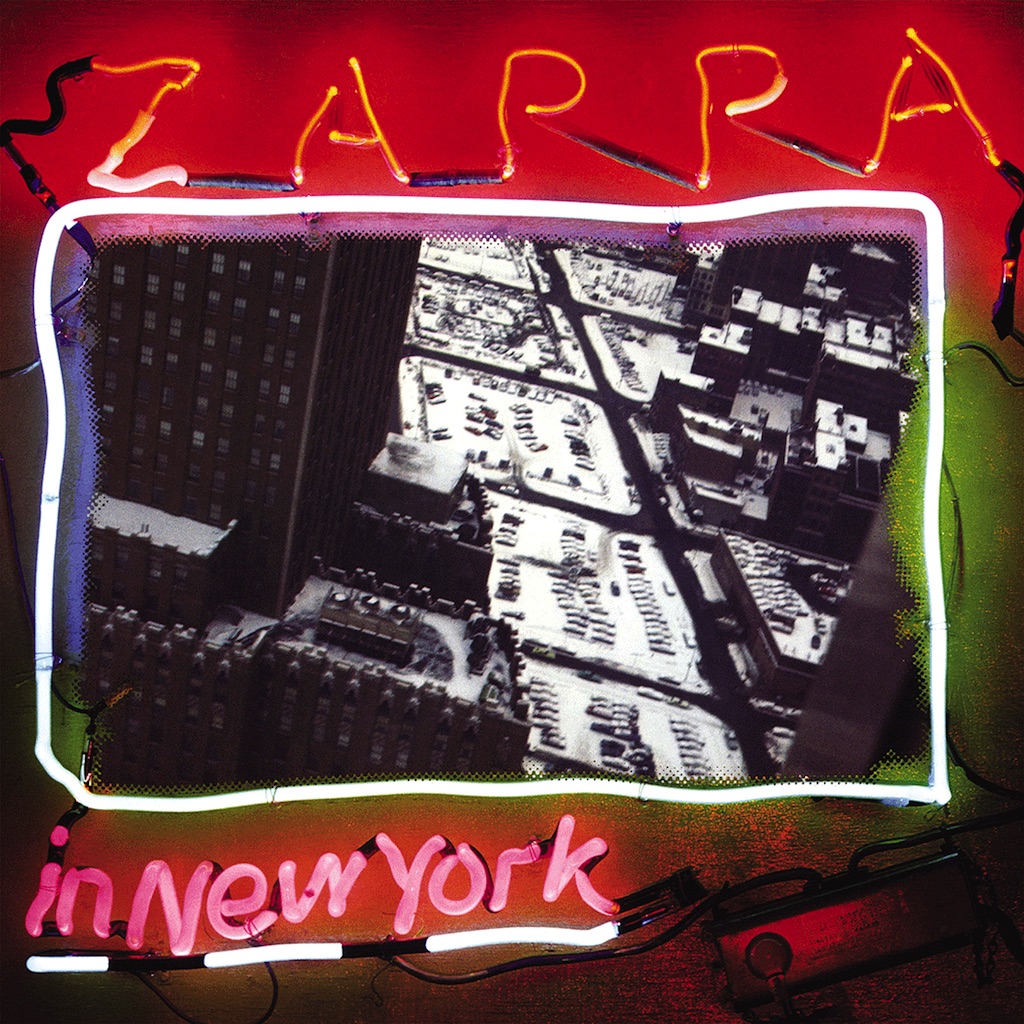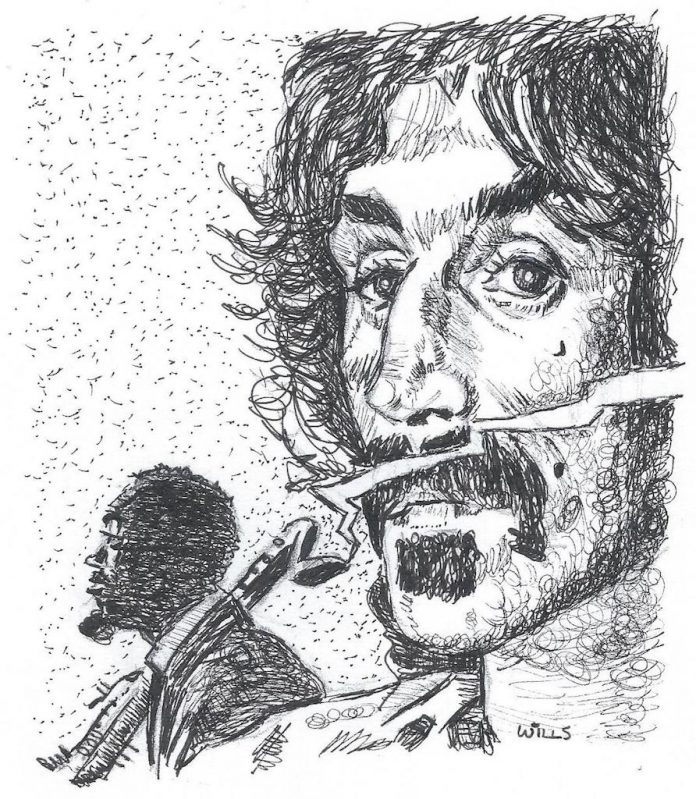Frank Zappa, who died 26 years ago at the age of 52, was a major figure in 20th century popular music. That a keen public interest in his work continues is evidenced by the fact that a deluxe 40th anniversary five-CD box set of his album Zappa In New York is about to be issued, while in April and May a tour of the USA and Europe entitled The Bizarre World of Frank Zappa, featuring Zappa alumni and a hologram of Zappa himself, will take place. In December, his son Dweezil tours the entire Hot Rats album in the UK.
Zappa’s music has a unique and easily recognisable quality, and is a brilliant and original synthesis of a wide range of cultural influences, including those of 20th century classical music, film music, cartoon soundtracks, American stand-up comedy and rhythm and blues.
Jazz was also a big influence on his music, although he was loath to admit it. Because of early adverse experiences in his life, Zappa liked to say one thing while doing another, and to keep people guessing.
He appeared to be scornful of jazz, as with his infamous statement on his 1974 album Roxy And Elsewhere that “Jazz is not dead … it just smells funny”. This may have resulted from bad experiences with snobbish jazz fans as a teenager, being snubbed by Miles Davis in 1961, and having to play with a mediocre standard-playing lounge group in the same year.
But although as a teenager he was not impressed by Charlie Parker, his consumption of albums by other jazz artists, including Oscar Pettiford, Charles Mingus, Thelonious Monk, Eric Dolphy, Harold Land, Ornette Coleman, Cecil Taylor and Oliver Nelson, belies his supposed aversion, as do the dedications to Mingus, Dolphy, Taylor, Roland Kirk and Bill Evans on the sleeve of his 1966 album Freak Out.
‘…his first excursion into a legitimate studio in 1961 was to record a bona-fide jazz composition, Take Your Clothes Off When You Dance. Interestingly, the tune was a bossa nova, recorded a year before Stan Getz’s Desafinado’
Prior to the release of Freak Out, his debut with the Mothers of Invention, Zappa had made a number of jazz-influenced recordings. In fact, his first excursion into a legitimate studio in 1961 was to record a bona-fide jazz composition, Take Your Clothes Off When You Dance. Interestingly, the tune was a bossa nova, recorded a year before Stan Getz’s Desafinado, and featured excellent, boppish solos by trumpeter Chuck Foster, altoist Tony Rodriquenz and pianist Danny Helferin. The track appears on the 1996 album The Lost Episodes, as does another gem, this time from 1963, namely the main title theme that Zappa wrote for the movie Run Home Slow. Here, it’s possible to detect hints of Miles Davis’s Sketches Of Spain, which Zappa used to listen to with Captain Beefheart as a teenager.
Zappa obviously had a great affection for the jazz waltz, and there are numerous examples in his oeuvre, for instance Toads Of The Short Forest and The Eric Dolphy Memorial Barbecue, both on Weasels Ripped My Flesh, 1970. An excellent jazz album consisting solely of Zappa waltzes is waiting to be made: in fact the Riccardo Fassi Band (1994) has gone some way to accomplishing this.
Zappa always employed jazz musicians in his bands. For instance, in the original Mothers of Invention, keyboard player Don Preston had worked with Herbie Mann, Elvin Jones, Yusef Lateef, Kenny Burrell, Pepper Adams and Shorty Rogers, while trumpeter Buzz Gardner had recorded in Paris with René Thomas, André Hodeir and Bobby Jaspar. Reed and keyboard player Ian Underwood, while on a scholarship to the Lenox Jazz School in 1959, had played with Jimmy Giuffre, Gary McFarland, Ornette Coleman and Don Cherry. The latter also sat in with Zappa and the Mothers in 1968, as did Roland Kirk in 1969 at the Boston Globe Jazz Festival, and as did Archie Shepp in 1984.
Hot Rats (1969) is perhaps Zappa’s best-known album. On it he collaborated with Ian Underwood, and it featured bassist Max Bennett and drummer John Guerin. The album showed how jazz chops and innovative production techniques could contribute in subtle and complex ways to rock. As Pacific Jazz founder Richard Bock said, it “was hard to classify; just fascinating instrumental music”. On the track The Gumbo Variations, Ian Underwood gives the impression that he has been listening to Albert Ayler’s album New Grass (1968).
‘…Another track, played by a medium-sized band, is the excellent jazz waltz Blessed Relief, sounding not unlike Frank Rosolino’s Blue Daniel’
1972 saw Zappa moving into what fans like to think of as his big band phase, with the albums Waka/Jawaka and The Grand Wazoo. With his leg in plaster after being knocked off stage in 1971, Zappa had time to think about new directions in his music and, according to ex-sideman Bruce Fowler, had been consulting with arrangers like Billy Byers, who was based on the West Coast at that time.
Strictly speaking, only a couple of tracks, for instance The Grand Wazoo and Waka/Jawaka fall into the category of big band music, exhibiting a hint of Gil Evans (cf. Blues In Orbit, 1971) and Gary McFarland. Another track, played by a medium-sized band, is the excellent jazz waltz Blessed Relief, sounding not unlike Frank Rosolino’s Blue Daniel. The session orchestra assembled for the two albums had an impressive line-up, featuring former Woody Herman, Buddy Rich, Gerald Wilson, Stan Kenton, Shorty Rogers and Pete Rugolo sidemen.
In 1973 Zappa created a tight, funky band featuring trumpeter Sal Marquez and violinist Jean-Luc Ponty, that could more than hold its own in the company of other major jazz-rock fusion bands of the era such as Mahavishnu Orchestra and Return to Forever. A key player in this group was pianist George Duke, fresh from a stint with Cannonball Adderley. Duke, influenced by pianists such as Les McCann and Herbie Hancock, contributed a soul-jazz feel to Zappa’s music, and two tracks that show off his playing and the band’s jazz strengths at this time are RDNZL and Inca Roads, both from the album The Lost Episodes (1996).

From a jazz point of view, 1976 was a key year for Zappa. For a series of shows at the New York Palladium in December of that year he augmented his band with some of the best musicians in the city, including the Brecker Brothers, Tom Malone, Lou Marini, Ronnie Cuber and Dave Samuels. The results can be heard on the album Zappa In New York (1978), and the instrumental music is in many ways a logical extension of the music from the Grand Wazoo era. A standout track is The Purple Lagoon, featuring extended solos by Michael and Randy Brecker, and Ronnie Cuber sounding like Pepper Adams. Also of note is The Black Page, a feature for drummer Terry Bozzio that has since become a test piece for every fusion drummer of note, and which pushed the boundaries of fusion and Third Stream music.
Over the years many musicians with a jazz background, such as percussionist Ed Mann and drummer Vinnie Colaiuta, contributed to Zappa’s music, and his final band, in 1988, another large ensemble, similar to the New York one, incorporated a more sustained jazz feel than had been heard in any of his previous bands. The album Make A Jazz Noise Here (1991) does just that, and on Broadway The Hard Way (1988) a version of Stolen Moments, with a Freddie Hubbard-influenced solo by Walt Fowler, convincingly recreates the spirit of Oliver Nelson’s original.
What of influence in the other direction, of Zappa on jazz? If Zappa has had any effect, it is probably mainly in the area of jazz fusion, in a general way and not just via albums like Hot Rats and The Grand Wazoo. The exceptional standard of musicianship which became the norm in his bands is now the standard to which jazz-based musicians automatically aspire. In a broader sense, Zappa pieces occur regularly in the repertoires of jazz musicians: King Kong has become something of a jazz standard.
Throughout his career, Zappa incorporated elements of jazz into his music. With the passage of time, jazz has become broader-based and more able to absorb new influences. The music of Frank Zappa is now, however imperceptibly, feeding back into jazz.
Geoff Wills is the author of Zappa And Jazz: Did It Really Smell Funny, Frank? (Matador, 2015)
















